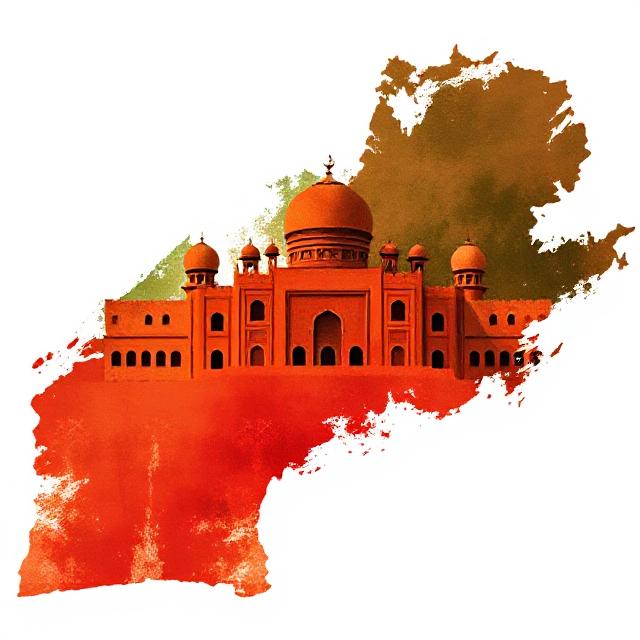Revisiting Khilāfah: An Islamic Constitutional Crisis in Pakistan and a Road Map for Reclamation
Author: Nabeela Mohiud -din
The Islamic Republic of Pakistan was envisioned to be the proponent of a state where Muslims could determine (or live under) the laws of their religion. The Objectives Resolution, passed in 1949 and subsequently incorporated into Article 2A of the Constitution, explicitly proclaimed that sovereignty over the whole universe lies with Almighty Allah alone and that authority is to be employed only within the limits prescribed by Him. Despite this Islamic identity, as this founding piece of law implied, today the structure and function of the Pakistani state reflect a structure that is altogether a Western parliamentary model. This divergence between Islamic legal identity and secular institutional framework is why Pakistan has not been capable of enforcing Shariah law and realizing its Islamic aspired position.
Pakistan's legal and political system is influenced by colonial legislation and British parliamentary democracy, neither of which is suitable for the structural characteristics of Islamic law. Political representation is mediated through parties, the center of power is in the capable hands of elected executives bound by short-term electoral cycles, and the judiciary often operates based on the 1860 Penal Code inherited from the British Empire. Institutions like the Federal Shariat Court and the Council of Islamic Ideology are constitutionally required to ensure that laws conform to Islamic injunctions, but their judgments and recommendations are usually overlooked, delayed, or challenged by the legislature and the executive. For example, the Federal Shariat Court consistently recognizes interest (Riba) as un-Islamic, but it has yet to be resoundingly and effectively enforced by any government, even though the Qur'an categorically prohibits usury (Federal Shariat Court, "Judgments on Riba and Islamic Finance," http://www.federalshariatcourt.gov.pk ,accessed 25 July 2025).
This scenario leads to a sort of legal schizophrenia where laws are said to be Islamic in principle but secular in application. The people of Pakistan are confused, as they have a judiciary and legislature that invokes the Qur'an but applies Western legal philosophy. Such confusion has also created a vacuum of sorts in which Islamic law appears to serve as a moral compass rather than a legal structure. Also, it diminishes the modern state's credibility domestically and elsewhere in the Muslim world as a possible model for an Islamic state.
Compared to the model in Pakistan today, the khilāfah model has a clear and consistent historical Islamic identity in terms of governance. The khilāfah is the singular political leadership of the Muslims governed by the Sharī‘ah alone, not by nationalism, tribalism, or party politics. It is neither a kingship nor a dictatorship; the caliph rules by divine law. The caliph is chosen according to consultation (shūrā) and is bound to the ummah by its submission to divine law. This model is fundamentally stable because the law is fixed in its legitimacy, being derived from the Qur’an, Sunnah, consensus (ijma‘), and analogy (qiyas). In a secular state, laws can be changed because they come from man; they become true laws insofar as man chooses to adhere to its laws. The caliph and all he does in exercising political authority are answerable to the ummah, and he can be purged or removed from office if he disregards in any way God's laws. Classical Islamic political theorists, such as al-Māwardī and Ibn Taymiyyah, provided well-developed and complex systems of checks and balances operating under the khalifah, including independent judicial institutions, a Bayt al-mal (public treasury), and public scrutiny of political power or authority.
The assertion that the khalifah would change an aspect of modernity is not accurate in the historical sense. Muslim civilization reached its scientific, cultural, and (juridical) heights under the system of the khalifah. The Abbasid and Umayyad caliphs fully funded and encouraged scientific advances in areas like medicine, mathematics, astronomy, and architecture (as well as others), all founded on an ethical Islamic framework. The fact that Ibn Sina, al-Khwarizmi, al-Rāzī, and others were able to contribute to the sciences of the world is because the Islamic system enabled knowledge that benefits human beings rather than competing with it. Wael Hallaq maintains that while the modern secularist legal system and its attendant bureaucracies may seem ethnically neutral, the Islamic legal system is far more robust and morally coherent than any legal system that colonizers have created since the encounter with colonialism disrupted the institutional life that Muslims lived day-to-day before that encounter (Wael B. Hallaq, The Impossible State: Islam, Politics, and Modernity’s Moral Predicament (Columbia University Press 2013)).
Pakistan today has a unique opportunity to start, or join, a revival of the khilāfah system. It is the only Muslim-majority power with nuclear weapons, it has a professional army, and Pakistani public sentiment has consistently reflected Islamic values. International surveys conducted by the Pew Research Center suggest that most Pakistanis hold strong views regarding the application of Sharī‘ah in public and private life (Pew Research Center, ‘The World’s Muslims: Religion, Politics and Society’ (2013) https://www.pewresearch.org/religion ,accessed 25 July 2025). Further, many of Pakistan's state institutions have already claimed to be Islamic institutions in some form, and with political will and constitutional reform, these institutions could be transformed. However, for Pakistan to progress towards genuine Islamic governance, it would have to move away from the party politics of parliamentary democracy (and constitutional democracy) to a consultative style, relying on accountability and justice, rather than contemporary politics, based on accountability and justice that upholds the will of Allah singularly for followers of Islam.
The potential for a resurgent khilāfah on the international level is no longer simply a theological argument with implications for the Muslim world. Political trajectories in the Muslim world, which are increasingly revealing the inadequacies of post-national, post-colonial nation-states, have included Turkish politicians calling for further acknowledgement of the Ottoman Caliphate that preceded the establishment of nation-states. Under Recep Tayyip Erdoğan, Turkey's political discourse has invoked the Ottoman Caliphate on multiple occasions. Even at the Organization of Islamic Cooperation summits, statements are made calling for greater unity and cooperation between the Muslim states along lines of military and economic concerns. Malaysia and Qatar have seen advantageous postures diplomatically in their foreign posture that emboldened nascent Muslim solidarity shielded by anti-Western utilization of their state sovereignty. While sectarian in orientation, Iran has touted pan-Islamism for years, framing it as resistance to Western political and economic systems.
These developments suggest a deepening disenchantment among many Muslims and the sight government with current models of governance. Palestine, Kashmir, Xinjiang, and Myanmar; the fragmented responses concerning individual Muslim states have been impotent in effecting fundamental changes. The political model of Khilāfah is comparatively an advantageous model, as it allows for collective action and strategic defense of the ummah in a situation of oppression. The Khilāfah is capable of collective action, effectively mobilizing diplomatic, economic, and military capabilities. The effect of the Khilāfah on the global geopolitical balance could be radical. Thus, it is incumbent on a system of Khilāfah, as twenty years of the moral abyss created by the years of Muslim government doing nothing for oppressed Muslims should be met by a system that allows a morally superior response to the suffering of all Muslims around the world, rather than a symbolic response.
Furthermore, there is tremendous developmental potential overall, as Muslim resources are unified under the khilāfah. Scientific research, technological development, and educational exchange in the contemporary Muslim world are dispersed and underfunded. For example, Pakistan, Turkey, Iran, and Malaysia are modern countries that have achieved some limited capabilities in nuclear energy, aerospace, medical research and development, and biotechnology, respectively. When these capabilities are not coordinated or collectively funded, these advancements seldom benefit the ummah. In a khilāfah-led initiative, Islamic research universities could be established, and some properties of transnational Islamic financial systems could be developed using instruments without interest. Moreover, halal standards can be established based upon authentic Sharī‘ah compliance. An economic model would depend on the Islamic principles of ethical productive performance, circulation of wealth, and protecting the vulnerable, and instead offer a humane, responsive alternative to the predatory logic of neoliberal capitalism.
To conclude, Pakistan's identity as an Islamic republic is compromised by its secular political and legal systems. The dissonance of values furnished by Sharī‘ah with political and legal institutions derived from the West has made Pakistan a paralyzed state incapable of complying with either Islamic principles or the demand for democratic legitimacy. The khilāfah of the ummah, in step with the Qur’an and Sunnah, provides a comprehensive alternative capable of achieving justice, unity, and moral leadership. Pakistan, at this stage of both strategic material and ideological resources, could potentially advance this paradigm shift, provided it aggrandizes the fantasy that Islamic law can ever flourish in a secular, compromised context. The return of the ummah, repatriating the system that at one time was a source of strength, dignity, and purpose on the world stage, will be dictated by the men of the ummah.
References
Federal Shariat Court, ‘Judgments on Riba and Islamic Finance’ (Federal Shariat Court, 2022) http://www.federalshariatcourt.gov.pk accessed 25 July 2025.
Wael B. Hallaq, The Impossible State: Islam, Politics, and Modernity’s Moral Predicament (Columbia University Press, 2013).
Pew Research Center, ‘The World’s Muslims: Religion, Politics and Society’ (2013) https://www.pewresearch.org/religion accessed 25 July 2025.
Rashīd Riḍā, Al-Khilāfah aw al-Imāmah al-ʿUẓmā (Cairo 1923).
Muhammad Khalid Masud, Shariah and Legal Modernity in Pakistan (International Institute of Islamic Thought, 2019).
Recep Tayyip Erdoğan, ‘Speech at the OIC Summit,’ Istanbul, 2022.
Salahuddin Abro and others, ‘Khilafat Movement: As a Catalyst for Greater Unity among Muslims’ (2024) 2(4) International Journal of Social Sciences Bulletin 1233–1238.

